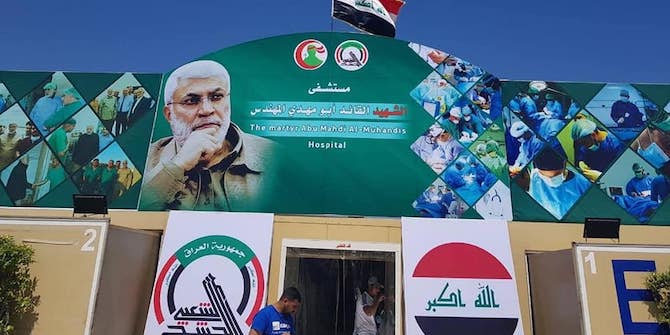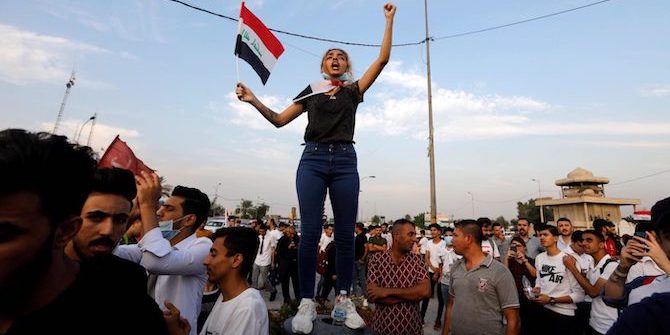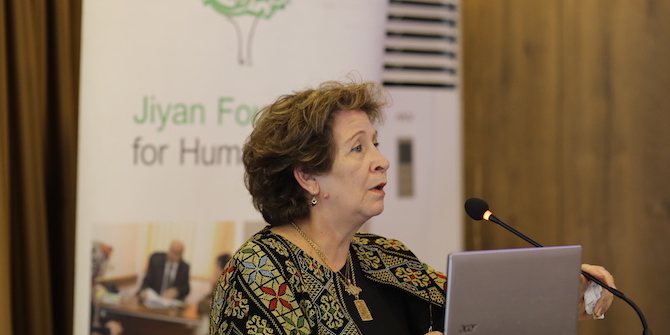by Nida Alahmad

A Contrast
The collapse of the Iraqi state during the 2006 civil war came on the heels of the US-led state-building project in Iraq. This collapse offers a sharp contrast with the ability of the Ba‘thist regime to keep, at least in appearance, the state intact despite tremendous institutional and financial pressures. How was this managed in the face of wars, debt, and sanctions. Another way to think about this is to look at state consolidation. The US-led occupation authorities drew on state-building expertise, even prior to the 2003 invasion, in preparation for rebuilding the Iraqi state. Despite the expert knowledge, international support, and availability of funds, the state was far from being built or consolidated, and instead collapsed. The former regime’s successful attempts at maintaining a cohesive state did not rely on expert knowledge, and it operated under severe external pressure. Accounting for this contrast means revisiting our theoretical understanding of the state and its relationship (as a sociological phenomenon) with expert, and other forms, of knowledge.
The State and its Politics: A Tautology?
If the collapse of the Iraqi state during the 2003 invasion can tell us anything about the explanatory veracity of social science, it should lead us to seriously reconsider how we understand the modern state in Iraq and the Middle East. The focus on the relationship between ‘state’ and ‘society’, especially in the context of an obsession with democratic transitions and regime types in Middle Eastern studies, have turned social science inquiry about the Middle East into one guided by normative (and/or political) agendas at the expense of understanding how things actually work. The Iraqi state, under the Ba’thist regime was viewed through the prism of the authoritarian regime type rather than as a sociological phenomenon, the persistence of which needs to be explained. Why, for example, the state survived during the sanctions period despite the weakening of key infrastructure and the lack of access to oil rents, was rarely a concern. That a state was not reducible to the type of regime governing it did not seem obvious (the rentier state paradigm, also mainly concerned with problems of regime types rather than states, could not have explained the survival of the state either. For further discussion see my piece in Constellations).
Understanding the state in terms of the politics that it seems to produce is not the sole preserve of Middle Eastern studies. The new institutionalist paradigm shift in political science shares the same set of fundamental assumptions: that legal and political institutions explain political outcomes, and to affect a desired political outcome all one has to do is intervene at the institutional level. The state has been reduced to its politics, and its politics reduced to the institutions. This is a tautology: using the effects of the state to explain what the state is. This paradigm becomes apparent and challenging it becomes easier once the system breaks down – once we have a crisis, and once the state that has been holding up the institutions and ‘producing’ politics, collapses. The period between the invasion of 2003 and the state collapse in 2006 offers this moment.
A Conceptual Consideration
In the Weberian definition of the state, the monopoly over the means of violence in a territory is a prerequisite to the establishment of (sociological) legitimacy, among the population, of the state as the organising order of collective lives. This reading of Weber is close to Charles Tilly’s historical sociology of the state. The US intervention in 2003 aimed at rebuilding the Iraqi state, and seemingly inspired by the tautology that sees state politics as an explanation of the state, began its project of state-building in reverse of this order – in other words, it saw legitimacy as a prerequisite to the establishment of a stately order with the monopoly over the means of violence in a territory. The first steps of the occupation’s Coalition Provisional Authority were to change the regime with the expectation that the new regime would be more favoured by the population (normative legitimacy), and thus the practicalities of state-consolidation and state-building would follow after. The focus on regime change, at the expense of physically maintaining the state, contributed further to its quick collapse in 2006.
A Methodological Consideration
The invasion and subsequent occupation of Iraq led to drastic consequences, both planned and unplanned, marking the start of a new era in the way that the country’s collective life was organised and conducted. The new political arrangements – brought into being and orchestrated by the CPA and some Iraqi political figures and parties – have resulted in a consociational model of rule which contributed to the institutionalisation of sectarianism as a political norm and contributing to the bloody civil war of 2006 (see, for example, discussions by Andrew Arato and Zaid al-Ali). The period from 2003 through to the 2006 civil war can be seen as one long episode of regime toppling and the emergence of sectarianism as a conflict driver. As a shorthand, I call this period the ‘long 2003’.
The long 2003 strongly resembles 1920, when Iraq was legally recognised as a British League of Nations’ mandate. In both cases an occupation was followed by direct foreign rule, with direct intervention in the structure and design of governance. This resemblance also extends to the (re-)emergence, in public debates, of the question of whether Iraq is an ‘artificial state’ or not – whether the borders of Iraq were a colonial imposition and do not represent the demographic composition of the country in terms of its ethnic and sectarian group identities. These parallels provide an opening for reconsideration of how we study the state in Iraq as well as the broader Middle East.
To begin with 2003 as a starting point for social science inquiry into the nature of the Iraqi state is very dangerous. It is, however, a very useful vantage point. 2003 is as dangerous of a starting point as 1920. Timeframes, like all methodological approaches, make certain politics visible (thus possible) and push others out of sight (thus irrelevant).
The 1920 starting point lends itself far too easily to the ‘artificial state’ narrative. As some historians and legal scholars have shown, this narrative is not only dangerous, it is also inaccurate. The artificial state narrative, however, is significant not because it reflects a certain reality, but because it has been a powerful idea that circulated among different groups of varying political viewpoints and degrees of political influence (see Pursley’s discussion of the wide range of subscribers to this idea).
If the British mandate was the big event of 1920, the sectarian civil war of 2006 and the American-led occupation and subsequent interventions were the big events of 2003. Sectarianism, and the primacy of external interventions in state-building, feed into the artificial state argument: that the state was forced on a population that does not have what it takes to be a nation. This is by no means a denial of sectarianism or its existence in Iraq or the region. But a reminder that we cannot deny the reality of a state, simply because the population is not homogenous in terms of its ethnic or sectarian identities.
I suggest that we begin with 2003 as the vantage point, rather than the starting point. This would allow us to reflect on the past and the present and think of future possibilities that are not narrowly defined by the headlines of breaking news. It means, in other words, a decentring of two interrelated narratives – that of the artificial state and the colonial narrative – without dismissing their sociological and political significance.
I would like to thank Nehal Bhuta, Ewan Stein, and the participants of the LSE Middle East Centre’s ‘Iraq Workshop: Rethinking the Contemporary Iraqi State after 2003’ for their feedback on ideas and earlier drafts of this post.






